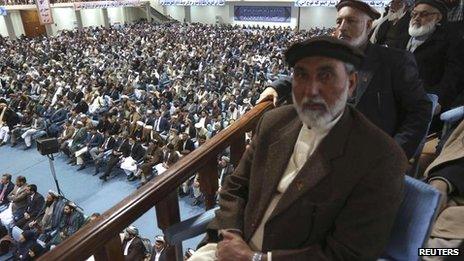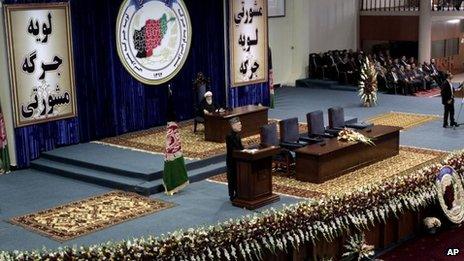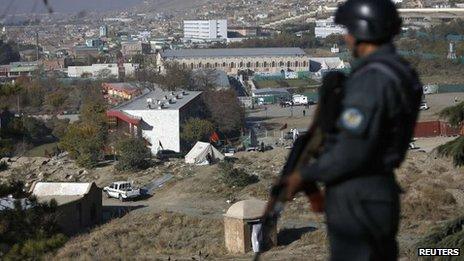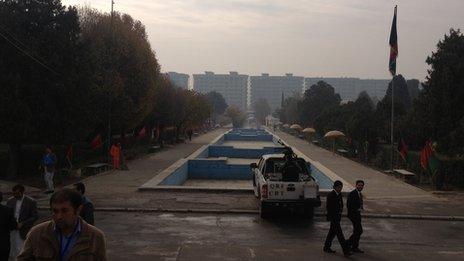US and Afghanistan clash on timetable for security pact
- Published
The BBC's Bilal Sawary in Kabul says security remains tight for the meeting
The US has said a new post-2014 security deal with Afghanistan should be signed by the end of the year - conflicting with earlier comments from Afghan President Hamid Karzai.
The US said it was neither "practical nor possible" to delay the signing.
As a gathering of Afghan elders debated the pact, Mr Karzai said it would not be signed until after 2014 elections.
The deal may see 15,000 foreign troops remain, although the US says it has not yet taken a decision on any presence.
'I don't trust them'
Opening the four-day grand assembly of elders - or Loya Jirga - in Kabul on Thursday, Mr Karzai urged the delegates to approve the new security deal.
He said that a number of world leaders - including from Russia, China, and India - were backing the accord, and that it would provide the security Afghanistan needed, as well as the foundation for forces from other Nato countries who were assisting Afghan troops.
But the tone of his comments reflected the difficulties both sides had experienced in the months it took to hammer out the details. The draft was made public only hours before the gathering.
Mr Karzai admitted there was a lack of trust between him and the Americans.
He said: "I don't trust them and they don't trust me. The last 10 years has shown this to me. I have had fights with them and they have had propaganda against me."
Debates
Loya Jirga delegates are now meeting in smaller closed-door groups to look at the deal in detail.
The delegates were divided into 50 groups, and were read each article in Dari and Pashto, allowing those without literacy time to debate each point.
The BBC's Bilal Sarwary, at the Loya Jirga, says the atmosphere in some rooms was relaxed, with delegates in favour of the pact.
But in other groups he could hear tense debates between the delegates.
Our correspondent witnessed one angry participant leaving in a protest, saying he had resigned from his position.
Afghan intelligence agents prevented the BBC from speaking to him.
Timescale?
Mr Karzai also appeared to strike a new condition - saying any pact would not be signed until after presidential elections.
The vote will be held in less than six months' time, and Mr Karzai has served two terms so cannot stand again.
His office could not confirm to the BBC whether Mr Karzai - or his successor - would sign the pact.
The US quickly rejected that timetable.
State department spokeswoman Jen Psaki said: "We believe that signing sooner rather than later is essential to give Afghans certainty about their future before the upcoming elections, and enable the United States and other partners to plan for US presence after 2014.
"It is neither practical nor possible for us to further delay because of the uncertainty it would create."

The Loya Jirga can make recommendations but its decisions are not binding

Hamid Karzai urged delegates to accept the deal

Security was intense at the Loya Jirga
White House spokesman Josh Earnest reiterated the US timetable: "It is important for this security agreement to be signed, approved and signed by the end of this year."
Mr Earnest also stressed that no decision had yet been taken on any post-2014 US troops, saying: "We have not yet determined whether a troop presence will continue in Afghanistan."
Currently the multinational Nato force is due to pull out of Afghanistan from 2014.
According to the draft agreed by the US and Afghanistan, the new pact would remain in force "until the end of 2024 and beyond".
However, Mr Earnest said the mission "wouldn't take that long".
Tight security
The draft of the pact appeared to have resolved two critical issues - US raids on Afghan homes and who would have jurisdiction over trying US soldiers.
On Thursday, US President Barack Obama sent a letter, external to Mr Karzai vowing to respect his nation's sovereignty, and pledging that US forces would not enter Afghan homes except for "extraordinary circumstances".

The consultative Loya Jirga is meeting in Kabul
Mr Karzai appeared to have conceded on jurisdiction for the prosecution of US troops.
The US-Afghan draft says: "Afghanistan authorises the United States to hold trial in such cases, or take other disciplinary action, as appropriate, in the territory of Afghanistan."
The Loya Jirga can amend or reject clauses in the pact, though its decisions are not binding. The deal will also have to be approved by parliament.
Security is tight for the meeting after a suicide bombing last weekend near the huge tent where it is being held.
The Taliban has branded the meeting a US-designed plot, and has vowed to pursue and punish its delegates as traitors if they approve the deal.